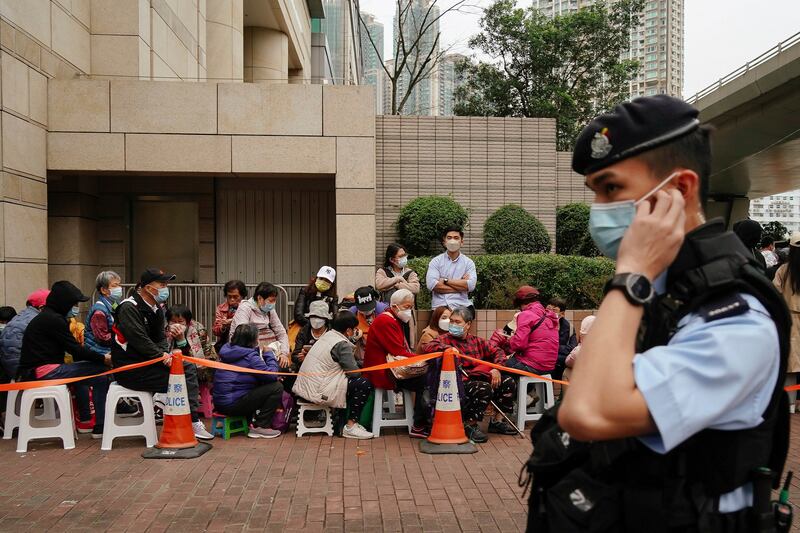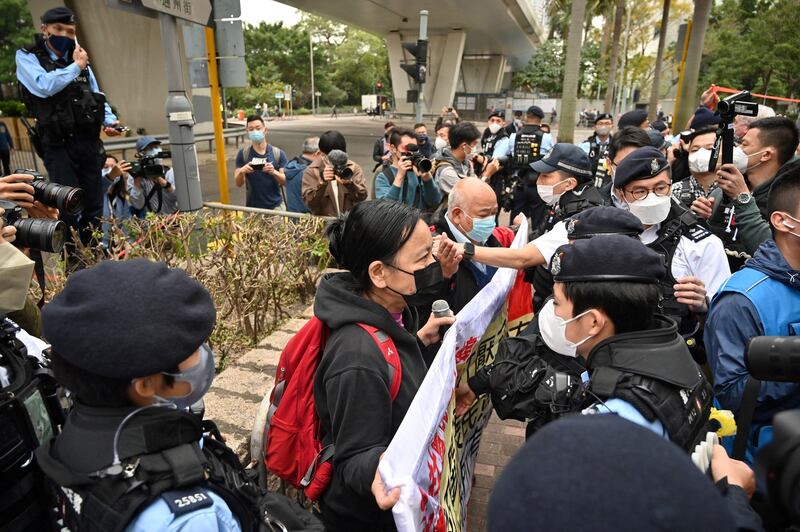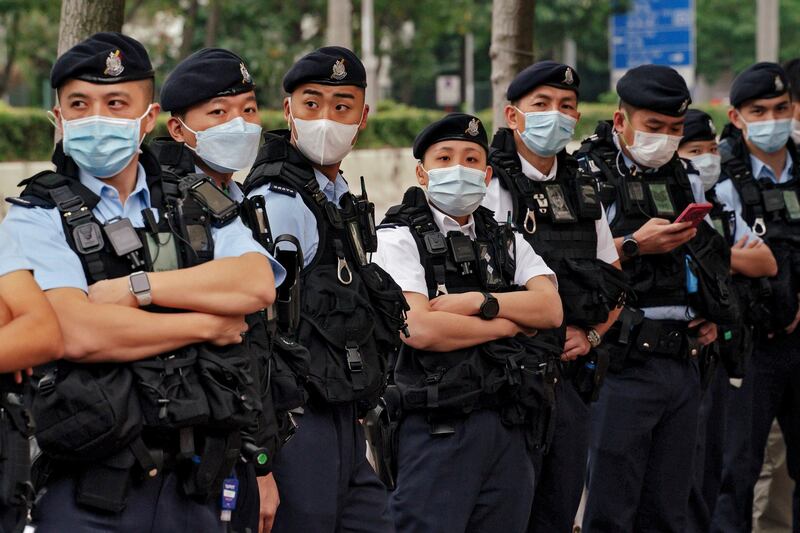A Hong Kong court on Monday began the trial of 16 defendants out of a group of 47 former opposition politicians and activists charged with subversion under the national security law for taking part in a democratic primary in the summer of 2020.
Former journalist Gwyneth Ho, a 2019 protest movement activist, former nursing student Owen Chow and labor unionist Winnie Yu are among those to stand trial in front of three government-picked national security judges and no jury.
It is the most high-profile trial to be brought under the draconian law, which was imposed on the city by the ruling Chinese Communist Party as a response to the 2019 protest movement.
The 16 are standing trial after pleading not guilty to charges of "incitement to subvert state power" linked to their participation in a democratic primary that the authorities said was a bid to subvert the government by winning a majority of seats in the Legislative Council.
The remainder, including pro-democracy activist Joshua Wong, Occupy Central founder Benny Tai and journalist-turned-lawmaker Claudia Mo, have pleaded guilty. All defendants could face life imprisonment.

Hundreds of people, including friends and relatives of defendants, stood in line early on Monday morning outside West Kowloon Magistrates Court to gain a public seat at the trial, as police in bulletproof vests with dogs patrolled the area, where taller security fencing had replaced the usual waist-height traffic barriers. A bomb-disposal truck was also parked at the scene.
A helicopter labeled on a flight-tracking app as belonging to the Hong Kong Government Flying Service hovered above the court building at around 8.30 a.m., circling the area at least twice.
Paid to stand in line
Some elderly people standing in line told Radio Free Asia that they had been paid HK$150 (US$19) an hour to stand in line for "just listening in for three or four hours," but said they had no idea what the case they were observing was.
Others responded that they didn't know what the trial was about or refused to answer questions, while some reportedly told other media outlets that they were getting paid to stand there, prompting speculation they had been sent to occupy seats to prevent supporters of the defendants from getting in.
Around 100 of those in line had brought seats and even sleeping bags with them, but brushed off reporters' questions with "I came here by myself," or "I don't know," or "I was bored" when asked why they were waiting for one of the 400 public gallery seats at the trial.
Meanwhile, Chan Po-ying, who heads the pro-democracy League of Social Democrats and deputy Dickson Chau held up a banner outside the court that read: "A democratic primary isn't a crime! Shameful suppression!" while calling for the release of the 47 political prisoners.
Chau was taken away by police for taking off his mask – which are still mandated in public places in Hong Kong – and fined HK$5,000 (US$637).
‘No crime to answer’
Before opening statements began, the 16 defendants entered their "not guilty" pleas, with Chan's husband and veteran activist Leung Kwok-hung telling the court: "There's no crime to answer. It is not a crime to act against a totalitarian regime."
Judge Andrew Chan responded by calling for "respect" from the defendants and members of the public.

As the trial, which is expected to last up to 90 days, got under way, prosecutor Jonathan Man told the court that four of 47, all of whom were arrested more than two years ago, would testify against the 16 now on trial.
The four defendants turned witness for the prosecution were former pro-democracy lawmaker Au Nok Hin, former district councilors Andrew Chiu and Ben Chung, and businessman Mike Lam, Man said.
Prosecutor Anthony Chau said the 2020 democratic primary was a "conspiracy" to undermine the government.
"This case involves a group of activists who conspired together and with others to plan, organize and participate in seriously interfering in, disrupting or undermining the performance of duties and functions ... by unlawful means with a view to subverting the state power," Chau said.
Thirteen of the 47 defendants were granted bail in 2021, while the other 34 – including 10 who pleaded not guilty -- have been in pre-trial custody for more than two years despite international criticism.
‘Evil will grow more rampant’
Chow, a frontline protester in 2019 who later stood in the primary on a "localist" platform aimed at preserving Hong Kong's unique identity, wrote on his Facebook page on Monday: "Evil will always grow more rampant when goodness lapses, so we must insist on what is right."
Gwyneth Ho rose to local fame for her live reporting on the 2019 protests, in particular her live footage of white-clad government supporters attacking democracy activists and passers-by at the Yuen Long MTR station on July 21, 2019, which included footage of them attacking her.

Amnesty International Deputy Regional Director Hana Young called for the charges to be dropped altogether, saying the activists were forced to choose between pleading guilty to "a non-existent crime" in the hope of more lenient treatment, or to stand trial with almost no hope of acquittal.
“With this mass trial, the Hong Kong government is attempting to shut off all meaningful political participation in Hong Kong,” Young told the Associated Press.
Following the democratic primary in 2020, the government postponed the Legislative Council elections the primary was preparing for and changed the electoral system so that pro-democracy candidates couldn't run.
The subsequent "election" of chief executive John Lee in a poll in which he was the only candidate wiped out any distinction between the city and the rest of mainland China, commentators said at the time.
More than 10,000 people have been arrested and 2,800 prosecuted in a citywide crackdown on the 2019 protest movement, mostly under public order charges.
Around 230 have been arrested under the national security law, which criminalizes public criticism of the Hong Kong and Chinese governments, as well as ties and funding arrangements with overseas organizations deemed hostile to China.
Translated by Luisetta Mudie. Edited by Malcolm Foster.
